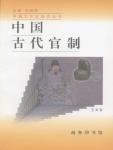Chapter 1 foreword
The splendid ancient culture of the motherland still has infinite charm for people today.However, when reading ancient classics, many people are often at a loss when they encounter dazzling official names, and sometimes they make jokes out of literal meaning.Such things have happened in ancient times.When Yang Shoudong, a man of the Ming Dynasty, was washing horses, he went home to visit his relatives and lived in a post station. The post office asked him: "How many horses do you wash every day?" A certain amount." (Volume 5 of "Yutang Congyu") In fact, washing horses has nothing to do with washing them.In the pre-Qin period, the word "washing" was the same as the word "xian", and Xima was Xianma, that is, "the person who guides before the horse" (Volume 24 "Xianma").During the Spring and Autumn Period, King Goujian of Yue entered the State of Wu as an official, and he was the ancestor of King Fuchai of Wu.In the Qin and Han Dynasties, Xima was an official of the prince, just like an attendant.In the Liang Dynasty of the Southern Dynasties, horse washing belonged to the Bureau of Economics and Economics.After the Sui and Tang Dynasties, he became an official under the prince who specialized in managing books, and he was a civil official with a relatively high status.Therefore, the predecessors in the academic circles attached great importance to the official system, and listed the mastery of the official system together with bibliography, chronology, and geography as the four keys to learning ancient Chinese culture.The purpose of writing this book is to introduce some knowledge about the ancient Chinese official system to readers.
To study the official system in ancient China, we must first understand the concepts of official and official system.The so-called official, as a whole, has two meanings.One is where the power resides, that is, the government.This is the original meaning of the official character.It is extended from the original meaning to "guan", and then extended to official; it can be seen that the category of ancient official characters is wider than that of today's official characters, including both officials and government.The second is to serve the monarch. "Shuowen Jiezi" explains: "Officials, officials serve the monarch." This explanation summarizes the nature of officials, that is, people who are under the monarch and act for the monarch.There are different explanations for the concept of official system.According to one explanation, the official system is the system in which the monarchs of successive dynasties set up official offices; another explanation is that the official system should also include the selection, appointment and dismissal, transfer, examination, rewards and punishments, retirement, etc. of officials.In fact, there is a clear boundary between the establishment of a government construction agency and the management system of officials in ancient times. In the Twenty-Four Histories, "Bio It is the former, but the "Electoral Records" only talks about the latter.The concept of official system used in this book belongs to the former interpretation, which refers to the system of establishing official bureaus in successive dynasties, that is, the ancient state power structure under the domination of the monarch.
Second, we must grasp the law of the development of the official system.The development of official systems in ancient China has two notable features. One is continuity, that is, the official systems of successive dynasties are always inherited and inherited successively.Just as Ma Duanlin said in the preface of "Wenwen Tongkao": "Although it cannot be completely the same in the end, it cannot be different in the beginning." This is what the Qing and Ming systems all said.The second is variability, that is, the official system in different periods is different.Whenever a new dynasty emerges, it always has to summarize the pros and cons of the previous dynasty's official system, consider the gains and losses, and inherit something; at the same time, it carefully plans and changes it according to the current situation.Even within the same dynasty, the official system is not static, and will be constantly adjusted due to the influence of various factors.If we grasp not only the continuity of the official system, but also its variability, then the complicated official names can be sorted out and the rules can be found.
China is a country with a long history. The dynasties of the past dynasties have accumulated rich experience in the official system and left a large number of documents. Not only are there special records in official history and political books, but they are also scattered in unofficial histories, anthologies, biographies, and notes. , Archives, Records, Local Chronicles and other books.This is unmatched by any country in the world.This precious historical heritage not only had a huge impact on the unification and consolidation of our country in the past, but also some things are still of reference today.Of course, it must also be pointed out that the ancient Chinese official system was formed and developed under the slave system and feudal system, which is fundamentally different from our current state institutions, and there are many insurmountable disadvantages.The dynasties in history have already entered the museum, but some ills have not been completely eliminated, as the deposition of history can still be seen in today's political and social life.It is of great practical significance to study the ancient Chinese official system, learn from its beneficial features, and overcome its harmful features.
Finally, it needs to be explained that in recent years, the study of ancient Chinese official system is in the ascendant, and many valuable papers and monographs have been published one after another, with remarkable achievements.In the process of writing this book, some of these achievements were referred to and absorbed (such as Zhang Jinfan's "General History of Chinese Official System").

